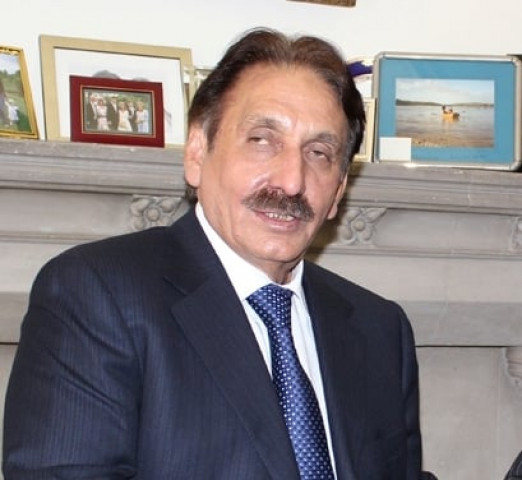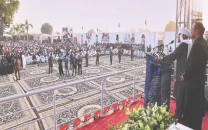Judiciary, parliament will never allow dictatorships: CJP
Iftikhar Chaudhry denounces marital law, calls for equal justice for all.

Vowing that parliament and judiciary would never support or allow dictatorships in future, Chief Justice Iftikhar Muhammad Chaudhry said on Saturday that only the man who honours law has the right to lead the country.
The chief justice was addressing the District Bar Association (DBA) on Saturday – a day that marked the five-year anniversary of the emergency proclaimed by former president Pervez Musharraf.
The lawyers’ community decided on November 3 to liberate themselves from the cruel clutches of dictators, he said. He added that on November 3, lawyers and civil society members vowed never to accept any unconstitutional step.
The chief justice further said that when the first martial law took place in the country, no one dared to resist it, which encouraged dictators and, thus, the process was repeated again and again, he said.
He said the lawyers’ movement not only liberated the judiciary but also ousted a dictator who had underestimated the rule of law, which, according to him, is a guarantee towards the security and survival of the country.
The chief justice further quoted Winston Churchill as saying that if justice is delivered in the courts, no one could defeat the country. He said that Islam teaches the importance of justice and that all are equal in the eyes of the law.
Chief Justice Chaudhry said that so far the dream of an independent judiciary has not been completed and it is a great responsibility on the judiciary’s shoulders. Therefore, he added, justice should be delivered to the people at their door steps without any discrimination and delay.
CJP to consider asking judiciary to supervise polls
Chief Justice Chaudhry, also the National Judicial Policy Making Committee chairman, told the Election Commission of Pakistan (ECP) on Saturday that he would consider asking the judiciary to supervise the polls in order to guarantee free and fair elections.
He said free and fair elections ensure stability and escorts the nation towards prosperity.
The chief justice made the comments in his introductory remarks at a special meeting of NJPMC held at the Supreme Court Branch Registry in Lahore.
The ECP had requested the appointment of judicial officers as district returning officers and returning officers in the forthcoming general elections.
He said that the reputation of the judiciary is at stake in the performance of these election duties due to the vested interests of different groups and corrupt practices. Therefore, he continued, at the time of formulating National Judicial Policy it was considered appropriate to keep the judiciary away from the elections process to focus its energies instead on clearing their backlog and deciding pending cases.
Chief Justice Chaudhry directed the ECP to submit a report on the capacity building and training of returning officers, district returning officers, presiding officers and polling staff.
During the meeting, the committee observed that the commission may be asked to explain how under section 7(5) of Representation of People’s Act 1976, a judicial officer being a returning officer can conduct an election independently and effectively. A discussion was held on the role of district returning officer and returning officer in the selection of presiding officers and how to make appropriate changes in the polling stations to ensure free and fair elections.
Published in The Express Tribune, November 4th, 2012.



















COMMENTS
Comments are moderated and generally will be posted if they are on-topic and not abusive.
For more information, please see our Comments FAQ